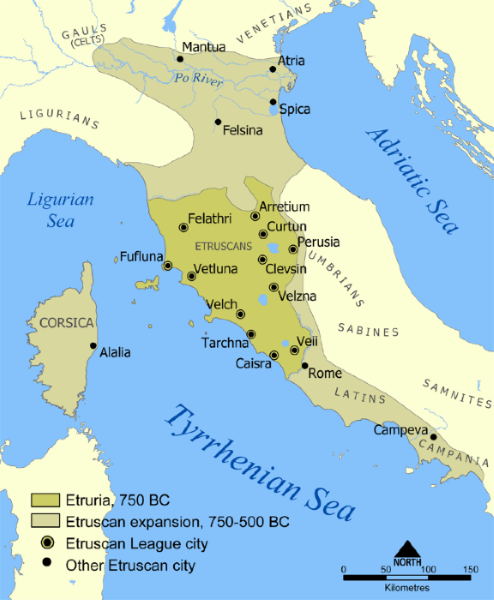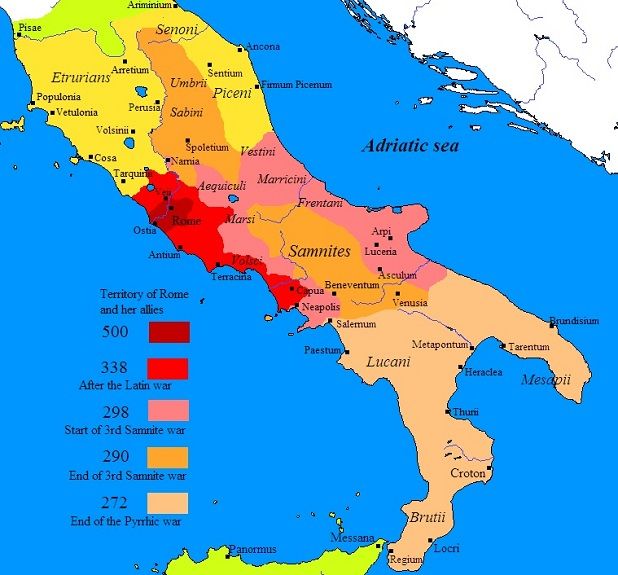|
A Timeline of Major Events during this period
BC
c. 1000 Latins, Umbrians, Sabines, Samnites migrate into Italy
c. 900 Etruscans migrate into northern Italy ... and over the following centuries establish their dominance over other Italian societies
500s Etruscan power and culture (similar to the Greeks) under the Tarquins is at its height
The Tarquins build up the city of Rome ... governing through several comitia (councils)
509 Romans join with other Latins to overthrow Tarquin power in their region ... and establish their own Republic
c. 450 Rome's extensive law code is displayed on 12 bronze tablets in the Roman Forum
400s Rome moves to dominance within the Latin League
396 Rome under Camillus (perhaps real, perhaps legendary), slaughters the Etruscans at Veii ... weakening deeply Etruscan power
390 Gauls invade from the north, destroying the Etruscans ... and nearly Rome as well
But Camillus (supposedly) is able to rally the Romans and then destroy
the Gauls ...
who retreat back north
338 Latin cities rise up against Roman domination ... but get crushed by the Romans
But the Romans wisely extend Roman citizenship to the inhabitants of
those cities
300 By this time, Rome has become deeply Hellenized (Greek) in culture
295 The Battle of Sentinum: Samnites also are finally brought under Roman control
275 The Battle of Beneventum: Greek King Pyrrhus of Epirus has been trying to force Roman Italy under his authority (280-275 BC), is defeated
also soon bringing Greek southern Italy (Magna Graecia) under Roman
authority
264 The beginning of the Punic Wars: Rome and Carthage (in north Africa) fight each other for control of the central Mediterranean
241 Carthage is defeated and expelled from Sicily, ending the First Punic War (264-241 BC)
220 Carthaginian general Hannibal invades Spain, crosses the Alps, and sets up Carthaginian power in northern Italy ... and overwhelms Roman power in many
subsequent battles
202 Roman general Scipio takes the offensive to Carthage itself, defeats Hannibal there, and breaks Carthage's power ... ending the Second Punic War (220-201 BC)
214 Rome organizes a Greek rebellion against Macedonian authority ... ultimately placing Greece, Macedonia and even Syria under Roman "protection"
187 Jealous Roman patricians, led by Cato (the Elder), falsely accuse Scipio and his brother of corruption; Scipio simply retires from public life
168 Greeks tire of Roman "protection" and revolt ... but are defeated at Pydna
149 A fast reviving Carthage inspires the Roman Senate to attack Carthage, destroy it, and make the region ("Africa") a Roman province, ending the Third Punic War
in 146 BC
148 Greeks at the same time rebel again against Roman authority ... but are finally (also 146 BC) brought by Rome under full Roman authority
133 The Gracci brothers, Tiberius and Gaius (Tribunes 133-121 BC), attempt to reform the
Roman constitution (land reforms) in favor of the common people (the
plebians);
121 The aristocratic (patrician) Senate reacts against the brothers violently (both die)
108 Very successful (and popular) military leader Marius is Consul (108-100 BC), and uses his military authority to put in place numerous reforms of the Roman
political system
91 Plebian tribune Drusus is assassinated in his effort to extend citizenship to all Italians ... sparking and plebian revolt and the beginning of the
Social War (91-87 BC)
88 Sulla marches his men on Rome to settle down a dispute that erupted over the Senate's extending citizenship to all Italians ... toughening Rome's politicial
system
86 Marius returns (also at the head of a Roman army) as consul and puts his own reforms back in place ... but dies soon thereafter
82 Sulla returns with his army to Rome and replaces Marius's reforms with his own rules
73 Slaves, under the leadership of Spartacus, rise in rebellion against Rome, but are crushed by Crassus's army (71 BC) ... lining the Appian Way with 6,000
crucified slaves
64 Roman general Pompey comes to fame in annexing Syria as part of the Roman empire
63 Cicero is elected Consul ... and attempts to move Rome back to traditional civilian (republican) rather than mililtary (imperial) government ... though he
will have little power to back up his efforts
60 Crassus, Pompey and Caesar form a Triumvirate (group three men) to direct Rome's affairs abroad
58 Julius Caesar comes to fame with his military victories in the Gallic Wars (58-50 BC)
53 Crassus is killed in battle with the Parthians (Persians);
52 With support of the Senate, Pompey takes control of Rome as sole Consul (52 BC)
49 Caesar learns that Pompey and the Senate are plotting to have him removed from all military command ... and marches his army on Rome ... scattering his
enemies.
Rome is now
totally under his military (imperial) control! The Republic is
dead.
AN OVERVIEW
OF REPUBLICAN ROMAN SOCIETY AND CULTURE |
The
Romans, coming along behind the Greeks (after defeating the Greeks
militarily in 146 BC and turning Greece into a Roman province), put
into effect a wonderfully ordered material civilization. This
civilization indeed gave witness to the power of human reason or human
engineering to work with the natural world in producing a place that
people often thought was perfection itself. Roman civilization
bore out the hope of the Greeks – by giving the West a practical
example of the orderly life.
The Romans were not intellectual innovators – as the Greeks were with
their powerful philosophies. Rather, the Romans were powerful
administrators – such as the Greeks themselves were never able to
be. The Romans, with their sense of legal or administrative
order, put the Greek ideas to work in life. Probably had not the
Romans done so, the Greek contribution might itself have been put aside
with its own growing cynicism and skepticism. Thus the Romans
contributed immensely to (materialistic) Western civilization by
demonstrating clearly that orderly cooperation with nature could
produce amazing results.
The ongoing influence of Hellenistic thought
Yet even under the practical-minded Romans, Western philosophy
continued to develop. But Roman philosophy tended to follow the
lines laid down by Hellenistic Greece in the two previous
centuries. Indeed, as once Eastern thought captured its Greek
conquerors centuries before, now Greek thought began to capture its
Roman conquerors. Thus did Greek Platonism and Stoicism continue
to draw Western philosophy forward, though now under Roman
patronage. Indeed despite Roman political ascendancy, the
Greek-speaking eastern provinces of the Roman Empire continued by their
own right to be vibrant and at times even dominant
cultural-intellectual centers within the Roman Imperium.
Indeed, once the Romans conquered the Greeks and turned Greece
into a Roman province, actually things Greek rapidly became the
standard for "higher" or "more civilized" ways of thinking and behaving
just in general.1
A Roman's ability to read, write and speak Greek fluently was
considered a necessary sign of higher social standing. Thus
schooling for Roman youth included lessons in Greek at a very early age
– and almost always instruction in Greek by Greek professors at the
higher levels of Roman education.
Thus it was that Roman art, literature, drama, philosophy, and even
religion were strongly shaped by Greek tastes and
interpretations. There were unique Roman contributions to each of
these intellectual forms of course. But at the foundations, the
Greek character of Roman culture was unmistakable. Indeed,
despite Roman political ascendancy, the Greek-speaking eastern
provinces of the Roman Empire continued by their own right to be
vibrant and at times even dominant cultural-intellectual centers within
the Roman Imperium.
The Roman concept of the "legal order"
Where things Roman differed from things Greek was mostly in the area of
politics and social organization. The Greeks (in particular the
all-dominant Athenians) seemed to see politics more in terms of the
general will of society – wherever that might take things … greatly
directed of course by clever manipulators of public opinion, such as
the Sophist-trained orators who specialized in the art of "demagoguery"
or manipulation of the public will. The Romans thought of
politics more in terms of what the legal order permitted or required of
those who would practice politics. In this area the Romans
strangely enough proved to be more abstract than their Greek
counterparts.
The Romans were greatly enamored with the idea of "order" in almost
everything they designed or developed. The Romans had a very well
organized law code which allowed them to rise above the tribal
mentality (all members of society related by blood and members of a
single genealogical line) and instead create a monumental society built
on a mutual respect for a politically neutral Code of Law ... one that
made all who came under its authority coequal partners in the Roman
social experiment.
In Roman eyes the Law – not the public will – dictated what was
supposed to be done ... and how it was to be done. Thus lawyers
rather than orators tended to dominate the Roman political scene – at
least during the Republican era. And thus also it was the Romans
who came up with the concept of the "state," a powerful but impersonal
institution that granted authority to various assemblies and officers
acting on behalf of this state – termed a "Republic"2 – in fulfilling the duties of their "office" as defined by the Roman legal system.
Thus Roman Law, though abstract in its design, was highly effective in
bringing a wide variety of peoples into a vibrant state of political
unity. In this area the Romans strangely enough proved to be more
abstract than their Greek counterparts.
Indeed, in this realm of social development, Rome left a legacy in the
West that exists to this day: the understanding that society ought to
be a community of laws, not of personalities or special social groups.
Of course that is a very high standard to which to aspire ... or to
maintain if achieved. Ultimately Rome itself could not maintain
such a lofty concept ... and declined as it left that standard behind
it. But the legacy remained and still serves to this day as a
major political ideal among Western societies ... whether actually
achieved or not.
Thus it is that we tend to idealize the Republic – probably a bit
caught up too much in the idealized vision of the Republic put forth
(and still read today) by Cicero, who wrote even as he saw his beloved
Republic coming to an end. Actually for most of its days the
Republic was run by a privileged elite, drawn from the very old
aristocratic patricians and from upstart plebeians who were able to
attain incredible wealth (usually at the expense of the other
commoners) and status through intermarriage with the patricians and
through acquiring a place in the Senate, which they guarded
jealously. There were Tribunes, selected for short terms (one
year) to watch out for the interests of the commoners, plus the
Assembly, which was supposed to give voice to commoners'
interests. But by and large during the Republic, the Senate did
what it could to keep a tight hold on the political life of the
Republic.
Rome's Cultural-Religious Pluralism
Another reason for its grand success was that Rome proved to be quite
tolerant of the social and cultural "pluralism" within its borders – as
long as everyone showed due respect to Roman authorities and their
gods. When the authorities themselves posed as gods this all
became quite curious. But for the most part everyone was willing
to play along with the Roman thing. Morally and ethically, Rome
didn't reach deeply into the private hearts of its subjects. That
belonged to their local gods and religious traditions.
The Roman Economic Order
The Romans also organized the world around them physically and
materially as they conquered it, building roads (still standing today
in many places) to provide rapid communication, troop movement and
ultimately commerce connecting the Roman center to its outlying
territories. Wherever they conquered, they planted military camps
on a perfectly uniform grid pattern ... which became the heart of new
commercial towns which quickly grew up around these garrisons.
They cleared the seas of pirates and kept marauding tribal raiders from
central and east Europe closed out beyond a well-defended line running
from the Rhine River in Germany to the Danube in the Balkan Peninsula.
Consequently, under Roman rule Europe, North Africa and the Eastern
Mediterranean area experienced an unprecedented peace and prosperity
that made "Rome" the very model of civilization itself to millions of
people.
However, ancient Rome went through a number of deaths – and a number of
reincarnations, springing back to life as a society reinvented into
some new form, always "Rome" but never the Rome it once was.
Maybe such change was a good thing. Maybe it was not. But
in any case, those who loved the Rome they were born to would suffer
tremendously from the loss or death of the Rome familiar to them.
The Roman Military
In the very early days of the Republic the army was basically a citizen
militia, whose soldiers, like the Greek hoplite army, supplied
their own armor and weapons and who trained and fought in tightly
packed formations (similar to the Greek phalanx) hurled at similar
enemy formations. With time this heavy but cumbersome structure
was broken up into a more flexible system of forming smaller and more
mobile units called maniples of approximately 100 men each. 30
maniples, supported by protecting cavalry and more lightly armed but
very maneuverable light infantry, formed a legion (typically 4,000 to
5,000 men).
Overall, such formation gave the Roman military tremendous advantages
in the conduct of battle … a major reason for Rome's incredible
political expansion across the Mediterranean world.
In those earlier years of Rome, its soldiers originally were simply
farmer-soldiers, propertied and thus with a personal vested interest in
the outcome of battle. But as time went on, with the increased
use of soldiers for political as well as frontier service, the ranks
thinned out from the huge number of casualties – and proletarii
(landless, usually urban, citizens) were recruited and salaried for
their service. Also foreign troops (often tribal cavalry units)
were recruited – for pay. By the end of the Republic, Roman
soldiers were more or less paid professional soldiers – motivated less
by a sense of civic duty than an affection for their commander who
rewarded or supported them with pay and whose own political fortunes
were what seemed most to motivate his legions. This shift in the
nature and purpose of the Roman legions was probably the single most
important factor in the death of the Republic and its replacement by
the Empire.
1This
however was also due in part to the earlier Etruscan influence, for the
Etruscans themselves modeled much of their cultural ways after the
Greeks.
2The word republic is derived from
Rome's Latin language, much as the word democracy is drawn from the
Greek language. In the Latin, republic is written as res publica,
meaning "thing of the people," that is, a government created by Roman
law belonging to no particular social group, no dynasty, but to all the
people.
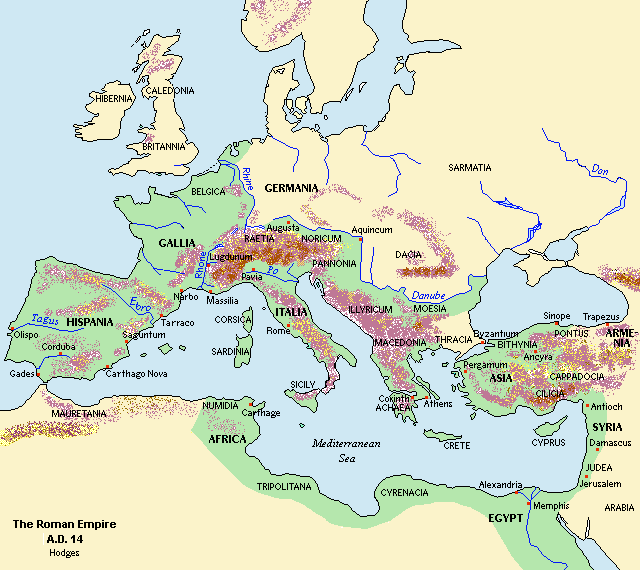
THE
ORIGINS OF THE ROMANS |
|
The first
Italians
Three
groups of Italian-speaking tribes – the Latins, the Umbrians and the
Samnites – migrated down into Italy from the north just about the same
time that the Dorians were overrunning Greece (around 1000 BC).
They too conquered with iron weapons, thus introducing the iron age to
Italy. They eventually settled into the mountainous center of the
Italian peninsula and in the west-central lowlands facing the
Mediterranean Sea. Basically, these peoples were farmers, cattle
raisers and sheep herders.
This
wave of conquest and settlement was followed in around 900 BC by
another – that of the Etruscans, who invaded central Italy from the
east. The Etruscans established ascendancy over the Italians, and
reached the peak of their power during the mid-500s BC. They
established cities and a high order of a material civilization – quite
like the Greeks … who seemed to have influenced deeply Etruscan culture
over the centuries.
Greek Italy
We
have already seen that the southern part of Italy, including Sicily,
was settled heavily by the Greeks as Magna Graecia. Here Greek
civilization attained great heights of achievement. It certainly,
along with the Etruscan culture, left a strong material legacy among
the Italians – though the latter held tenaciously to their distinct
Italian language.
The
actual origins of Rome itself are submerged beneath a heavy overlay of
patriotic myth – and thus it is hard to get at the "facts." The
town was created through the joining of a number of settlements found
among the "seven hills" located along the middle Tiber River.
These eventually came to comprise early Rome.
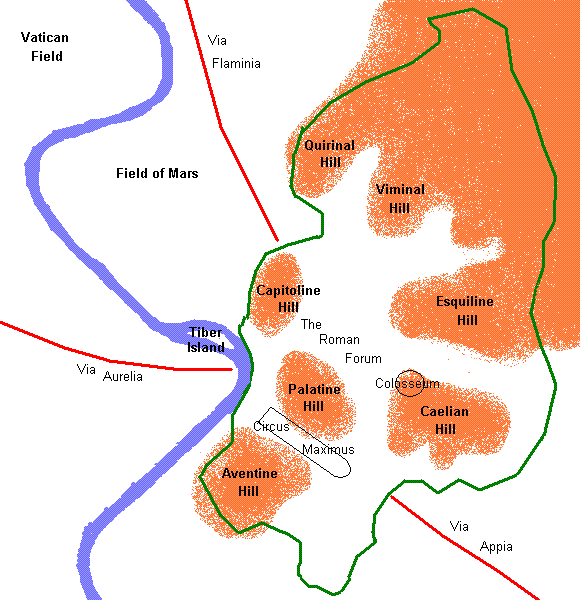
Myth
says that two Latin brothers, Romulus and Remus, were responsible for
laying out the foundations of Rome on the Palatine Hill in 753
BC. But an Etruscan royal line (the Tarquins) seems to have
established itself in Rome by the 500s BC. The Tarquin monarchy
ruled the town and environs – though it was by and large a positive
rule, building up Rome with an extensive city wall, public buildings
and public water and drainage works and bringing commercial prosperity
to Rome. It also developed a very effective military force.
The Etruscans also gave Rome its first experience in representative
government, laying out Rome's basic governmental framework of several
councils (comitia and their
leaders or consuls) to oversee Rome's various civil and military
functions. It was at this time that a body of local "first
citizens" or Roman patricians grew in prestige and influence within
Rome itself.
4The
origins or ethnic background of the Etruscans remains a grand mystery
to historians. They apparently spoke a non-Indo-European language
unrelated to the Greek, Roman, Celtic languages of the region ...
perhaps having roots in the region even prior to the arrival of these
Indo-Europeans.
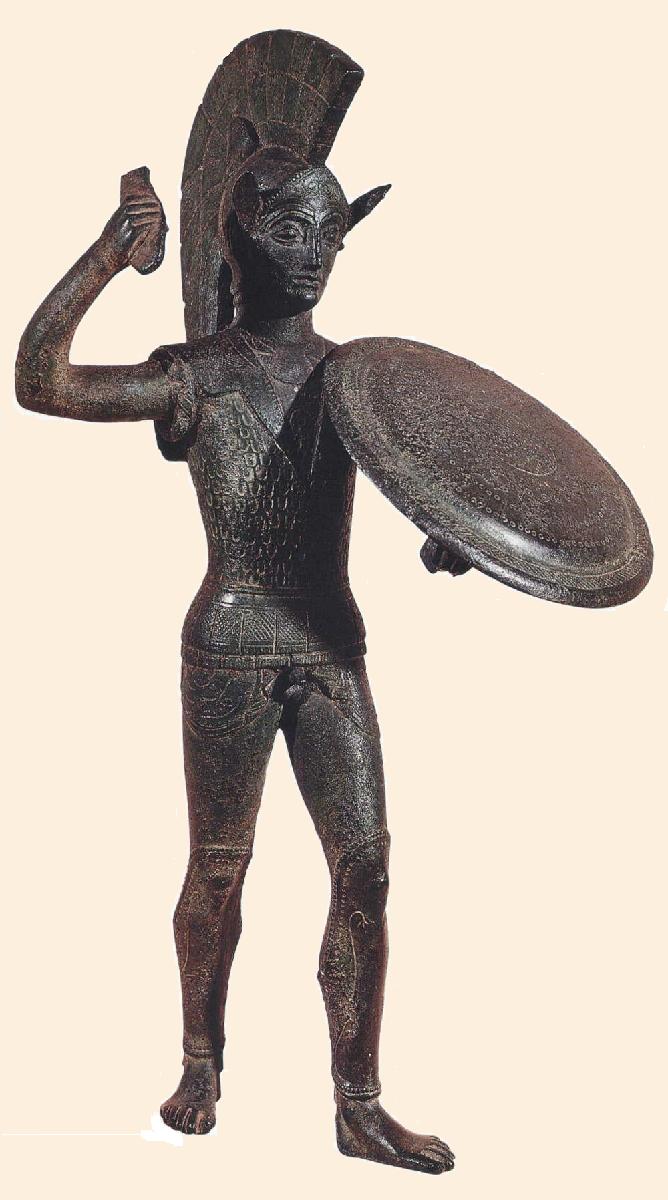
Etruscan warrior or Mars
(mid 400s BC) bronze
Florence, Museo
Archeologico
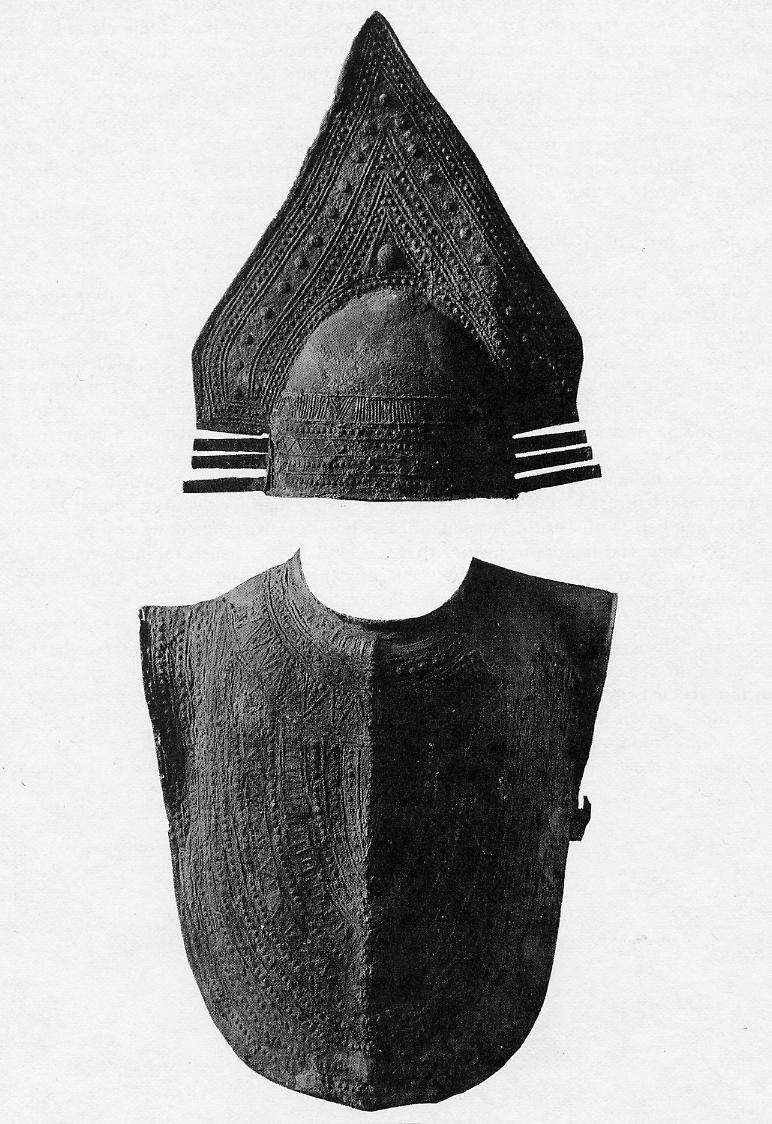 Villanovan (Etruscan) helmet
and body armor Villanovan (Etruscan) helmet
and body armor
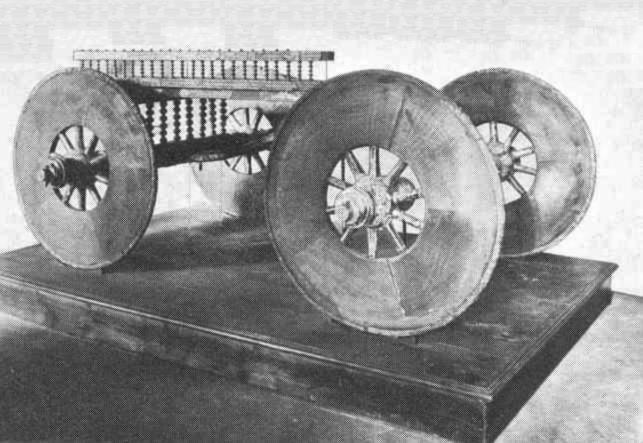
Etruscan horse-drawn
chariot
Museo Civico di
Como
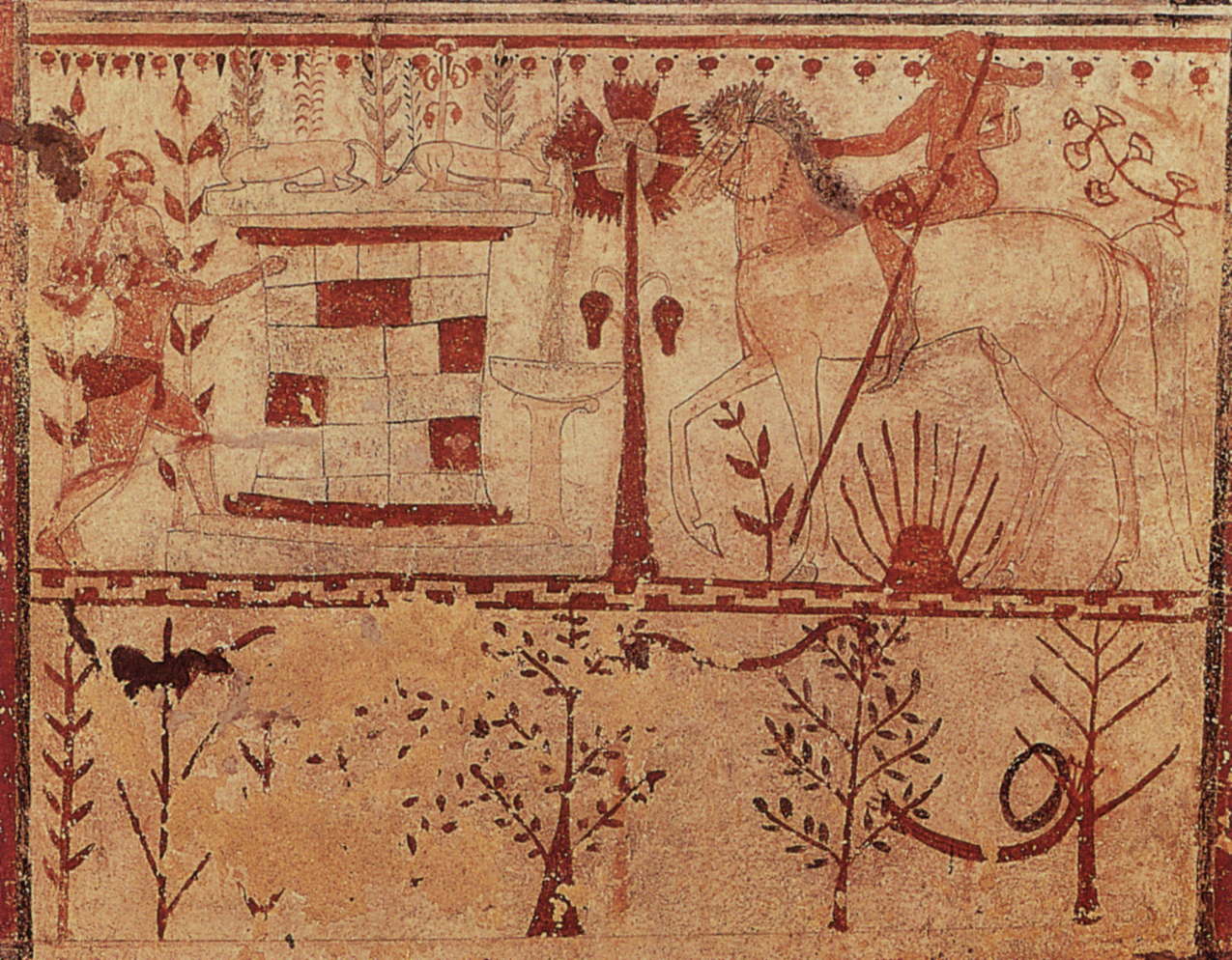
Ambush of Prince Troilus
by Achilles — Detail of painted wall
Etruscan Tomb of the Bulls,
Tarquina (540-530 BC)
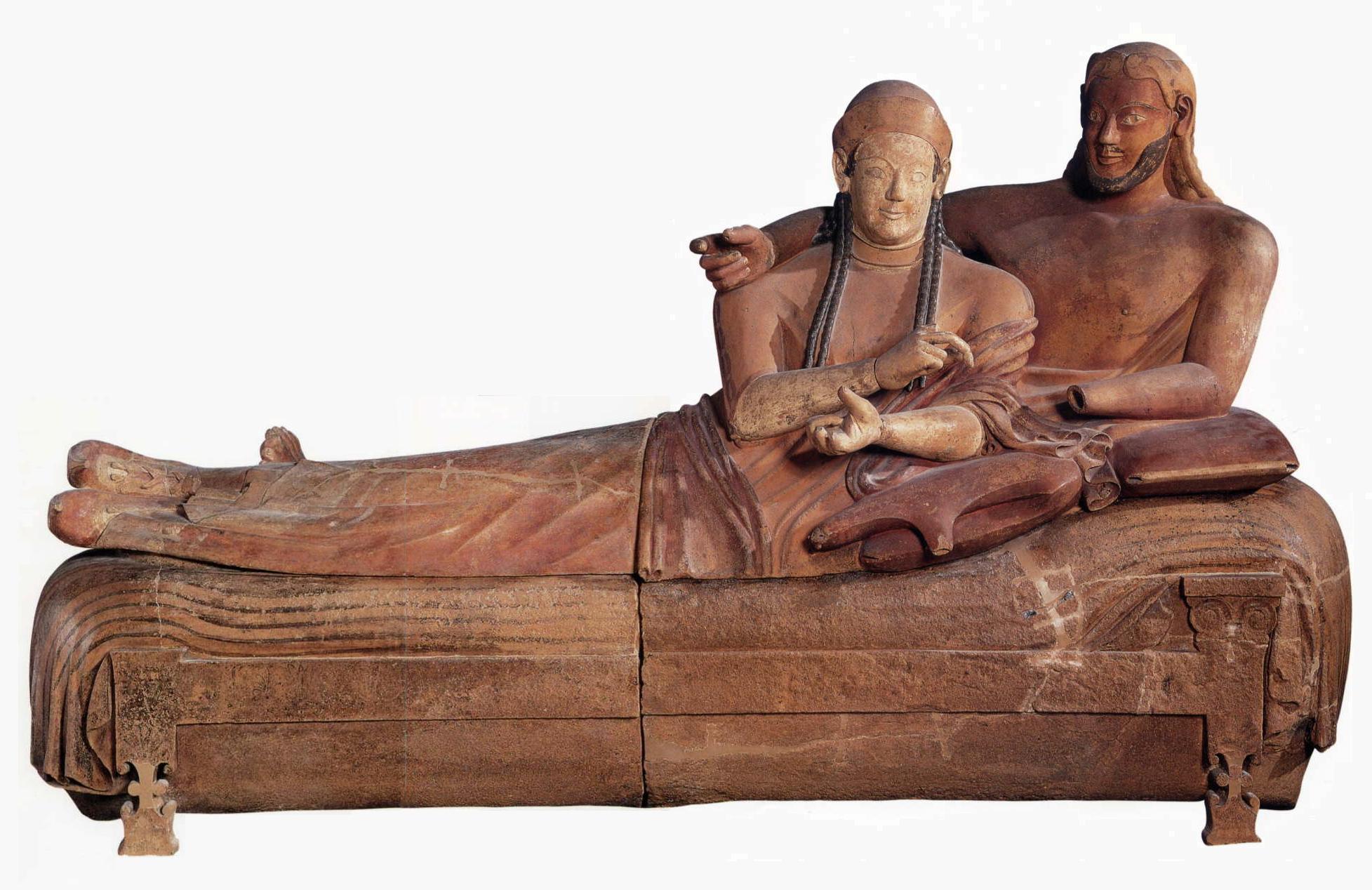
Etruscan Sarcophagus of
the Spouses (late 500s BC) polychrome terra cotta – from
Cerveteri
Paris, Musée du
Louvre
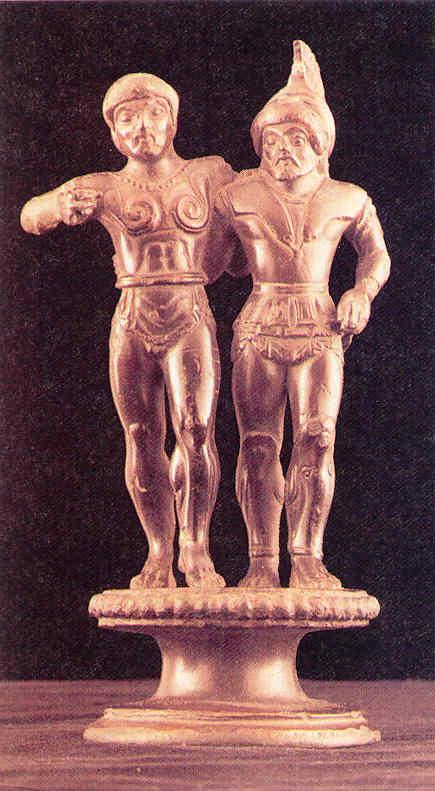
Two Etruscan
Warriors
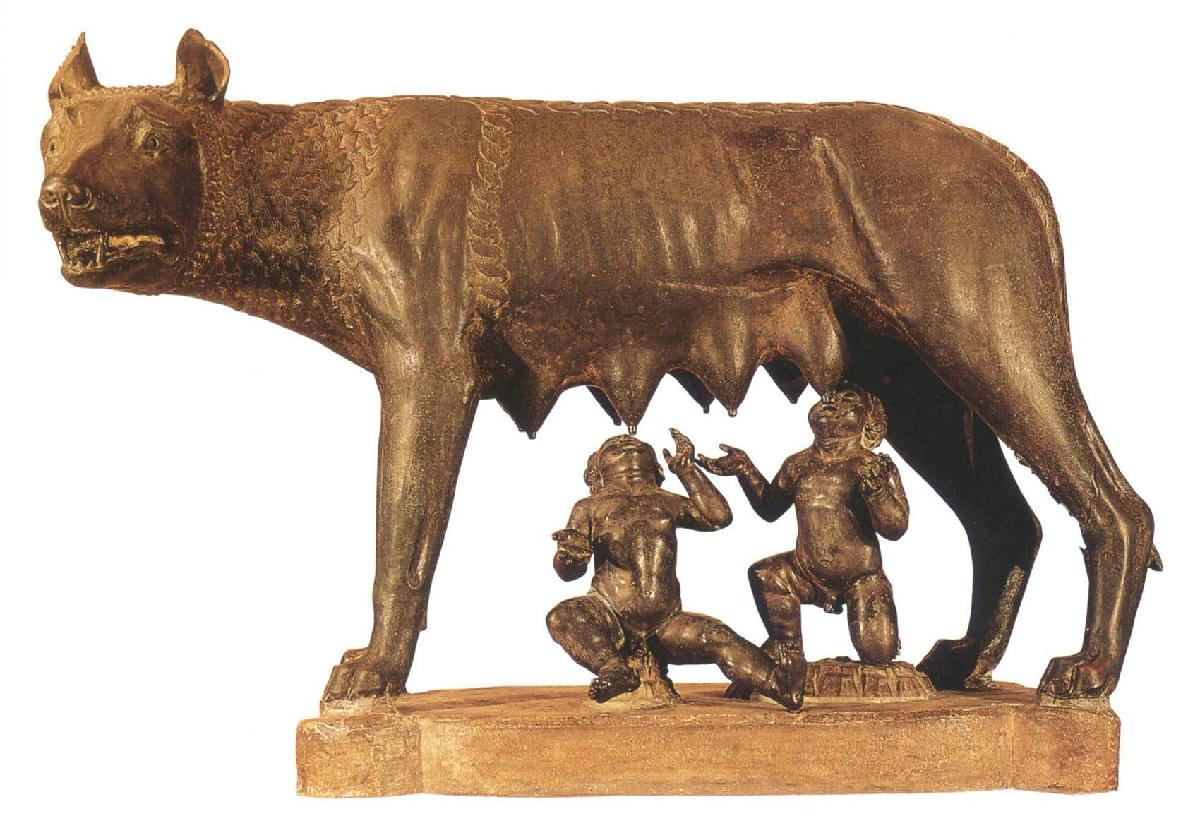
The
"Capitoline" she-wolf
(early 400s BC and possibly Etruscan) bronze
(the twins, Romulus and Remus,
probably date from the
late 1400s)
Rome, Palazzo dei
Conservatori
THE
EXPANSION OF REPUBLICAN ROME |
|
Early rise among the
Latins
In
the late 500s BC Rome began its expansion by entering into alliance
with other Latin cities against Etruscan dominance. In 509 BC
they expelled the Etruscan King Tarquin ... and established their own
Republic.
But
gradually over the next century and a half, Roman leadership within the
alliance turned to dominance within the alliance (much as Athens was
doing at about the same time).
With
this growing power, Rome put increasing pressure on the Etruscans. In
396 BC, during an ongoing conflict with the nearby (and quite wealthy
and powerful) Etruscan city of Veii, the Romans awarded the temporary
position of dictator to Furius Camillus, who led the Romans finally to
success in the conflict ... slaughtering the entire male population of
Veii and enslaving its women. Henceforth the Etruscans would
remain troublesome – but no longer a major threat – to Roman designs in
Italy.
Against the Celts
But
just as the Romans were beginning to enjoy the fruits of victory, Celts
or Gauls invaded from the north and not only crushed the Etruscans,
they sacked Rome itself (but failed to capture its citadel) in 390
BC. Once again the Romans called on Camillus (who had been
banished by jealous rivals) ... and at the head of a 12,000 man army he
and his army slaughtered the Gauls – who had fallen into a drunken
stupor after pillaging Rome. Then – largely to restore unity
within a socially divided Rome (plebeians or commoners against the
patrician class) – Camillus turned his troops on neighboring cities in
the region.
After
that, as quickly as they had come, the Celts also retreated from
Rome. Soon the Celts settled back into northern Italy, leaving
Rome to recover quickly.
Etruscan collapse
But
the Etruscans were quite thoroughly devastated by the Celts. The
Etruscans soon lost power as a vibrant society – and mysteriously their
culture disappeared. They left us with no knowledge of their
language and very little of their history.
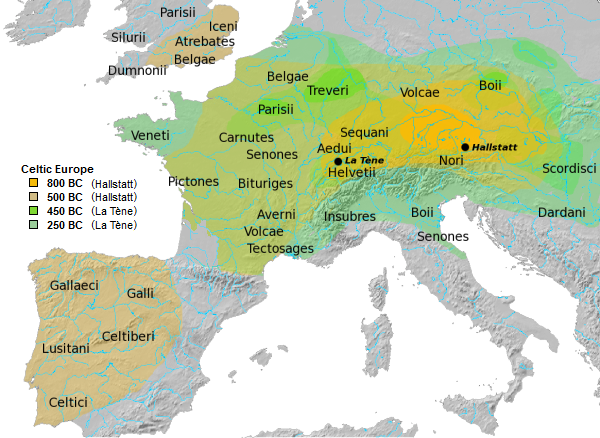
Roman expansion
This began the process of the extensive development of Rome’s citizen
army ... and the aggressive policy by which Rome approached the rest of
Italy. This in turn sparked bloody wars with Rome’s neighbors –
which Rome crushed one by one.
Absorption of the Fellow Latins and the Samnites
In 338 BC a number of Latin cities rose up in revolt against Roman
dominance. But the Romans responded swiftly both militarily in
crushing the Latin uprising and diplomatically in extending Roman
citizenship to the conquered Latins.
Also, the fellow Italian Samnites in the mountain valleys of central
Italy tried to block Roman expansion through a series of wars or
uprisings beginning in 343 BC – though they too (along with some
Umbrian, Etruscan and Celtic/Gallic allies) finally fell to Roman power
at Sentinum in 295 BC.
Relations with the Greeks in Southern
Italy
For
a while the Greeks and the Romans were cooperative, with the Romans in
fact adopting many Greek cultural features – many of them transmitted
earlier to the Romans by the Etruscans during the monarchy.
Notably there was the Roman adoption (with many modifications) of the
Greek alphabet. Indeed, by 300 BC the process of Hellenizing
Roman culture was moving rapidly forward – especially through the
romanticizing of Alexander and his exploits, which led the Romans to
idealize Greek power, Greek culture, Greek philosophy, Greek religion.
But
Roman political expansion and the question of which of the two powers
was to dominate southern Italy was destined to produce friction with
the Greeks in Italy. A Greek reaction – joined by some Latin allies
also resenting Roman dominance – finally took form around the ambitions
of King Pyrrhus of Epirus, who (equipped with some awesome elephants)
managed at first to defeat the Romans in several battles. But
these victories were so costly to Pyrrhus ("Pyrrhic victories") that it
depleted Greek power and discouraged their Latin allies – to a point
where the Romans were finally able to defeat Pyrrhus in 275 BC at
Beneventum. Quickly thereafter Roman mastery of southern Italy
became complete. But there was still a mighty Greek presence in eastern
Sicily in the form of prosperous Syracuse.
Against
Carthage
Carthage5
was a great sea power located on the North African coast just across
from Sicily, as well as in western portions of Sicily itself. At
first competition for the Carthaginians came from the Greeks (during a
century-long war from 367; the Romans were fairly friendly to the
Carthaginians). But after the defeat of the Greeks by the Romans,
the Romans and Carthaginians were left facing each other for ultimate
dominion over the seas around southern Italy and the lands around the
western Mediterranean that began to interest the Romans.
The
clashes came in the form of a series of wars – the Punic Wars – fought
between Rome and Carthage over the next 120 years (264-146
BC). Carthage was a formidable opponent, with a powerful
navy and a huge, prosperous urban population to put muscle to their war
effort. But Rome had an experienced, battle-tested land army.
The First Punic War (264-241 BC) linked Hieron II of Syracuse with the Romans in expelling the Carthaginians from Sicily.
The Second Punic War (220-201)
started when the Carthaginian leader Hannibal Barca attacked Roman
Saguntum in Spain, then crossed the Alps with a mighty army and
for 15 years held off Roman efforts to dislodge him from northern Italy
– until Rome decided to take the war to Carthage itself, where at Zama
(202 BC) Hannibal lost his only battle (but also the war) to the Roman
general Scipio "Africanus" (considered still today as one of the best
generals in history). Carthage was stripped of its war-making
powers as a result of the war. Tragically, the Roman patricians
(upper-class) were jealous of the popular Scipio and brought him to
trial for unfounded charges of bribery and treason, resulting in his
retreat in disgust from Roman public life.
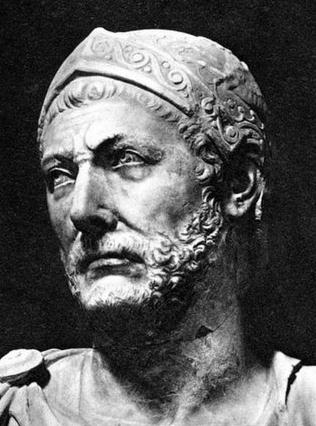 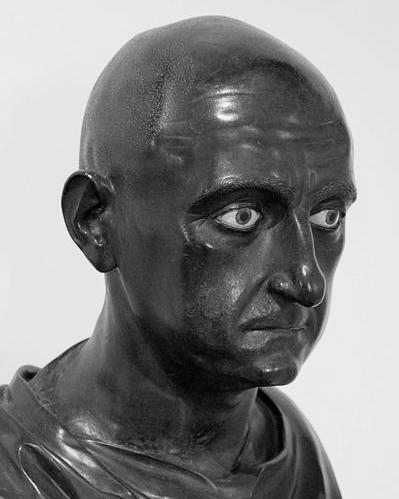
Carthaginian
General Hannibal Barca / Roman General Scipio Africanus
The Third Punic War (149-146)
occurred when the leading families in the Roman Senate decided that it
wanted no further competition from a fast-reviving Carthage, found an
incident that permitted them to return to war, eventually marched on
the city, and after a 3-year siege, burned it to the ground.
Carthage was destroyed and Africa (the region around Carthage) became a
Roman province.
Against the Greeks
Philip
V of Macedonia unfortunately had chosen to ally himself with Hannibal
during the Second Punic War and Rome. Once Hannibal had been
defeated, The Romans turned their attention to Philip and led a
rebellion of Greek states against the Macedonian monarchy in 214
BC. This drew Rome deeply into Greek affairs and a number of wars
involving Rome in Greece – and also in Macedonian Asia Minor and Syria
under Antiochus. Rome "liberated" these Greek cities and
placed them under Roman protection – as Macedonian power was chipped
away.
But
eventually Roman dominance bred its own opposition in the Greek
East. Perseus of Macedonia tried to rally these Greek sentiments
– but the Romans quickly marched out to defeat him at Pydna (168
BC). The Romans did not follow up their victory in such a way to
discourage further thoughts of rebellion ... until 148 when a final war
with the Greeks and Macedonians (148-146 BC) brought Macedonia under
full Roman dominion as a Roman province and the rest of Greece under
the full "protection" of the Roman governor in Macedonia.
In
Asia Minor and Syria the Romans continued the pretense of a mere
"protection" placed over local Greek power – but made and unmade kings
and rulers at will. Roman rule was in fact complete in these
regions.
5Carthage
was itself a colony established in today's Tunisia by the
Semitic-speaking Phoenicians of the Eastern Mediterranean coast
(largely today's Lebanon) in the 9th century BC.
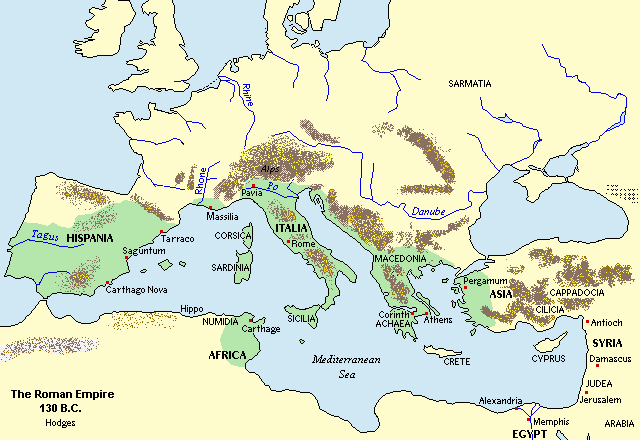
EARLY
ROMAN POLITICAL ORGANIZATION |
|
The Monarchy and the Comitia
The Tarquinian monarchy in Rome shared its power with several
assemblies or comitia whose power increased/decreased over the
centuries: the Comitia Curiata or popular assembly of all
freemen, the Comitia Centuriata or military assembly, and the Comitia
Tributa or tribal assembly (presided over by 10 Tribunes). There
was also the Senate, a council of elders serving for life as advisors
to the king – a council which grew in power and eventually took the
lead in the political life in Rome after the overthrow of the monarchy
(traditionally in 509 BC).
The Patricians and the Plebeians
There were among some of these early Romans a number of families of
"worthier" nature – the patrician families – marriage into which
offered a preferential placement in the Roman scheme of
things. The powerful Senate of course was dominated by
these patrician families.
Yet simple membership in any of the families of the permanently settled
Romans – the common citizens or "plebeians" – accorded itself some
important rights in the life of the Roman community. Indeed,
there was a most unusual openness about Roman life, its readiness to
adopt others into its communal life – even freed slaves. In fact
a freed slave living in Rome automatically became a Roman citizen.
The Republic
According to tradition, the Tarquinian monarchy was overthrown in 509
BC. The patricians were behind this action and it represented the
victory of the traditional Latin agrarian gentry over the newer
commercial groups closely connected to the Etruscans and Greeks through
trade. It marks a time of decline of Etruscan power – and the
growth of Roman military expansion.
With the new Republic, two patrician Consuls (serving one-year terms)
replaced the king as the head of the Senate and the military
Centuriata. But eventually (through plebeian pressures) a number
of Tribunes, representing the interests of the plebes, were accorded
both the power to protect the poorer Romans and certain veto powers
over the acts of the aristocratic Republic
.
There were a number of other Roman officials, the Quaestors (judges),
the Censors (tax officials), Aediles (public works supervisors) and
others whose powers, along with the whole governmental structure,
were carefully defined in the 12 tablets of the Roman constitution (ca.
450 BC) – posted in the Forum for all to see. All Romans knew
these laws well.
|
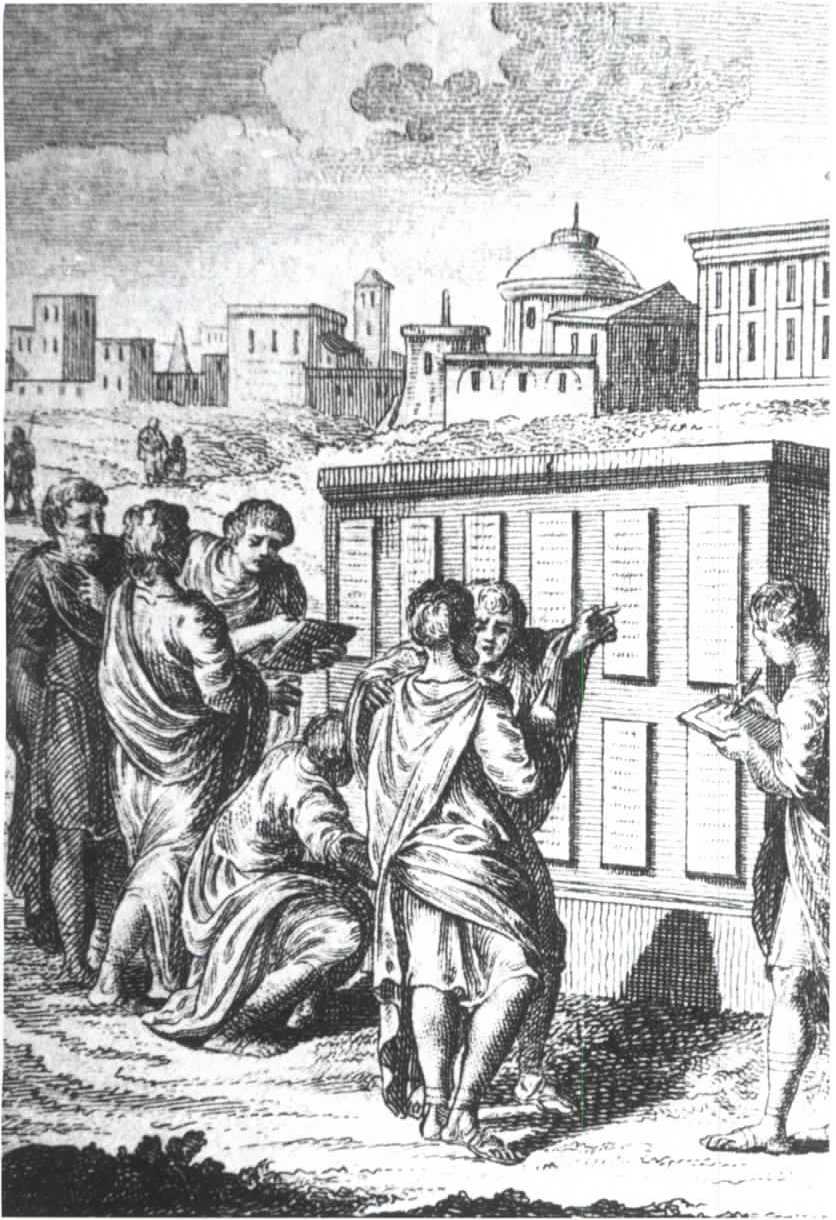
The 12 Tablets of the Law
|
The Dominance of the Roman Senate
This rise from an expansive agrarian power in west-central Italy to the
point where Rome now commanded the fabulous civilizations that ranged
around the Mediterranean (Macedonian Egypt, however, had not yet fallen
to Roman rule) – all this change was bound to have a profound effect on
the internal disposition of Rome.
Over time, but particularly during the wars with the Carthaginians, the
Roman Senate had become the center of all Roman power. It was a
club of old patrician families and new plebeian wealth (new landowners)
which closed its ranks and became a ruling oligarchy. Meanwhile
rising taxes and competition from slave labor were bringing the Roman
commoners to ruin. Roman power, especially the power of the Roman
military, was built on the services of these commoners. Something
drastic needed to be done to save Rome from collapse or revolution.
The Efforts to "Reform" the Roman Constitution
For three centuries the unchanging character of the Roman Constitution,
fixed on those Twelve Tablets, had served Rome well in keeping
political ambitions under fair control. But political ambition is
very difficult to manage … and for Rome the difficulty merely increased
with the increase in power of Rome itself.
Much of the social-political trouble was between the patricians or the
"equestrian" class dominating the Senate and controlling the wealth of
the countryside and the populare or common citizens demanding greater
influence in the life of the Republic. This conflict was greatly
complicated by the demands of the Italian allies for full Roman
citizenship (entry to which had been tightened up since it had become
so much more profitable since the Punic Wars).
Tragically for Rome, well-intended reformers finally stepped forward
with proposals to bring economic and political reform to Rome.
But what they did not realize was that such reform would merely open
the door wider to political contests … as "reforms" in favor of one
political group soon led to "counter-reforms" of an opposing political
group. Thus the rigidity of the 12-tableted Constitution now
became more "flexible" … that is, subject to political intrigue.
As a consequence, Rome's firm foundation on Law rather than Human Will
began to shatter … and the Constitution became no longer
"constitutional."
Roman Law would now read according to the interests of one group or
another that had managed to take control of Rome's political
dynamic. And tragically Rome's legal standards now became simply
the matter of the political interest of this group or that.
Rome's Republic was in trouble … deep trouble ... and sadly had no idea
of what could be done about mounting political animosities that only
worsened once the process of "reform" got underway.6
The Gracchi brothers (133-121 BC)
Two brothers, Tiberius and Gaius Gracchi, elected successively as
Tribune, tried to act on behalf of the plebeians to bring economic and
political reform to Rome. Essentially, they proposed the increase
of common lands for the use by the small farmers, the allotment of
newly acquired lands to retired soldiers, and the broadening of the
powers of and the electorate for the Assembly.
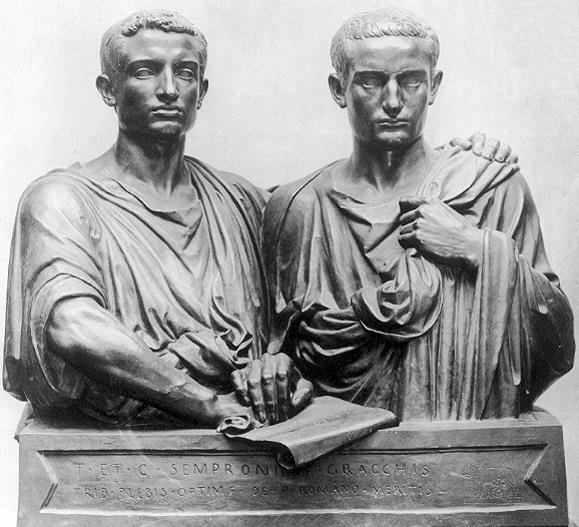
But
the brothers' reforms were blocked by the Senate. When riots
resulted, martial law was declared by the Senate and Tiberius was
murdered in the confusion. Gaius, who took his brother's place at
the head of the plebeian party, had Senate partisans sent after him and
he committed suicide rather than face arrest. Nothing serious
came of the reform efforts.
Marius (108-100 BC)
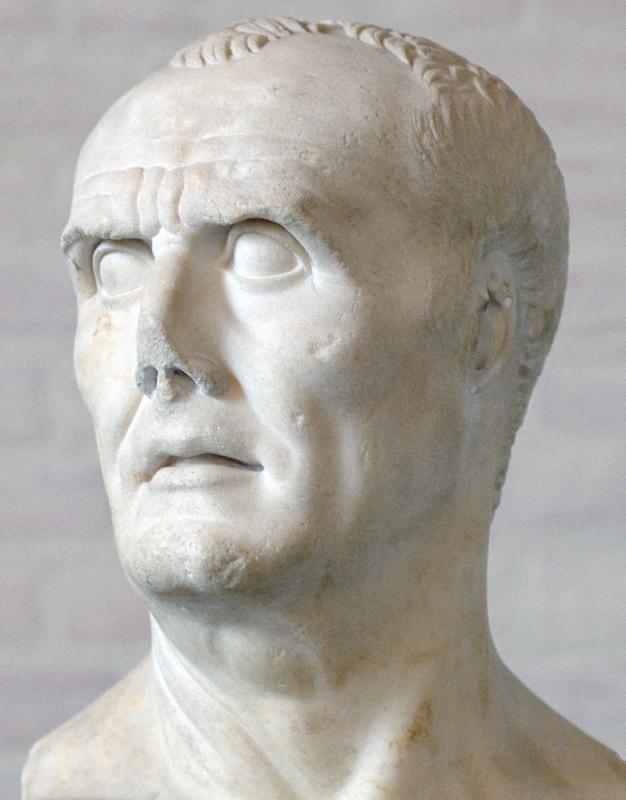 A
mix of events then brought to the fore a capable military leader, Gaius
Marius, who through his important military victories became so
influential that he was repeatedly elected consul (seven times!).
On numerous occasions he moved to clean out political corruption or
incompetency in the army and public administration, save Rome itself
from invading barbarians, and institute reforms in the army to make it
more democratic and higher in morale. But the power to enact such
reforms came not from the people through the workings of the
constitution ... but instead through the use of the intimidating power
of the Roman armies Marius led (plus his own dangerous and bloody
obsession with removing anything or anyone who got in his way).
Having succeeded in his reforms, he retired. A
mix of events then brought to the fore a capable military leader, Gaius
Marius, who through his important military victories became so
influential that he was repeatedly elected consul (seven times!).
On numerous occasions he moved to clean out political corruption or
incompetency in the army and public administration, save Rome itself
from invading barbarians, and institute reforms in the army to make it
more democratic and higher in morale. But the power to enact such
reforms came not from the people through the workings of the
constitution ... but instead through the use of the intimidating power
of the Roman armies Marius led (plus his own dangerous and bloody
obsession with removing anything or anyone who got in his way).
Having succeeded in his reforms, he retired.
The "Social War"
his
title describes various events that accompanied a shifting of power
within Roman society as Rome moved through the last century BC.
Reformers now fought back and forth in support of this political
interest or that political ideal – violently. Marcus Livius
Drusus was assassinated in 91 BC after alienating the Senate with his
efforts to move things in favor of the Roman commoners – and Italian
allies desiring full citizenship as members of the Empire.
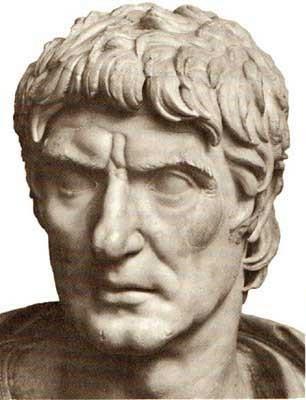 After revolts by Rome's Italian neighbors, and after Marius was returned to military service – along with a new figure, Lucius Cornelius Sulla
– order in Italy was restored … although the Senate decided in 88 BC to
go ahead and extend citizenship to its neighbors anyway. But this
merely promoted a further spirit of reform under the Tribune, Publius,
bringing the Senate again to reaction. After revolts by Rome's Italian neighbors, and after Marius was returned to military service – along with a new figure, Lucius Cornelius Sulla
– order in Italy was restored … although the Senate decided in 88 BC to
go ahead and extend citizenship to its neighbors anyway. But this
merely promoted a further spirit of reform under the Tribune, Publius,
bringing the Senate again to reaction.
Thus Sulla decided to march his army into Rome and end the reform
momentum … in the process decreeing a number of political changes which
reduced the powers of the people's Tribune and made the aristocratic
Senate more absolutely the ruler of Rome. He also had numerous
individuals arrested and executed … and even turned on Marius –
declaring him to now be an outlaw. He then headed off to Asia
Minor to put down a rebellion there.
This prompted Marius to make his own military move on Rome, killing a
number of opponents, and in 86 BC having himself elected as Consul (his
8th time) … to once again put in place a number of popular
reforms. But he died a few weeks later and chaos thus simply
spread throughout Italy.
Then in 82 BC, with his campaign in the East completed, Sulla returned
to Rome – again in full accompaniment by his army – and confirmed his,
not Marius's, reforms as the model for Rome. Sulla then retired.
The slave rebellion led by Spartacus
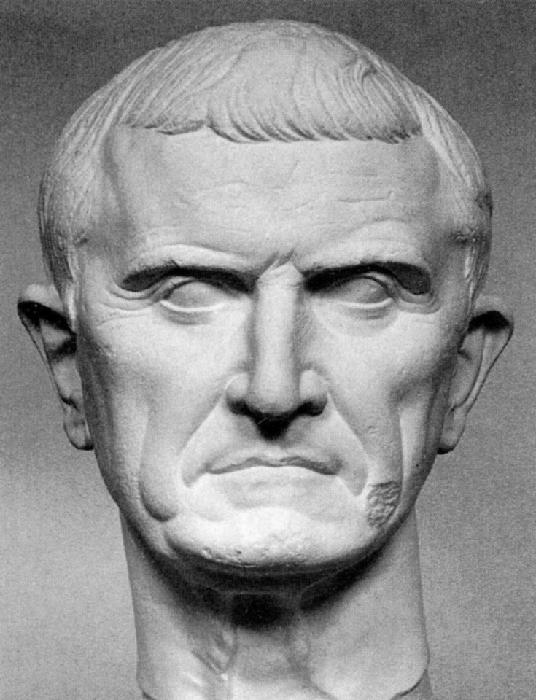 However, a
reign of terror rested over the land – producing the semblance of peace
only through fear. Whole regions lay desolate. And in 73-71
BC the slaves (joined by the Roman paupers) even went into revolt led
by the gladiator Spartacus, conditions having become so bad. However, a
reign of terror rested over the land – producing the semblance of peace
only through fear. Whole regions lay desolate. And in 73-71
BC the slaves (joined by the Roman paupers) even went into revolt led
by the gladiator Spartacus, conditions having become so bad.
Finally the Senate called on the very wealthy patrician, Marcus Licinius Crassus,
to suppress the rebellion. Crassus's legions chased down
Spartacus's rebel army, crushed the rebellion, and lined the Appian Way
with 6,000 crucified (hung on wooden crosses) bodies from Rome all the
way south to Capua (120 miles).
The End of the Republic
Ultimately Rome was finding itself being captured by its captive
cultures …and by those most responsible for such capture, the Roman
army. Ultimately the Empire, built on military rather than Roman
family power, both noble and common, would replace Republican Rome –
for better or worse.
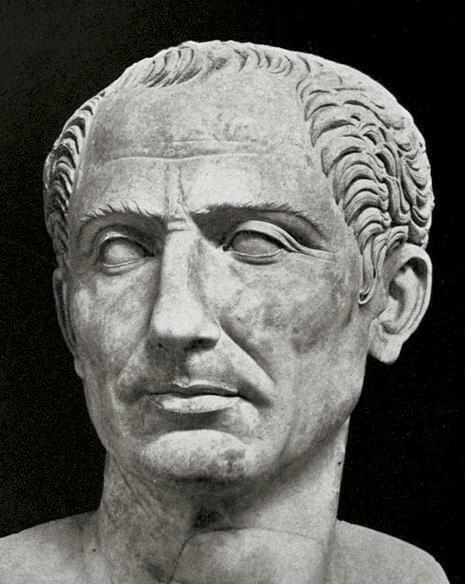 The Triumvirate: Caesar, Crassus and Pompey.
Three key figures would soon come together in an effort to bring Rome
back to some kind of order. All three, of course, were military
leaders. One of these was Julius Caesar, nephew of Marius and of
the reform party. Caesar was not only a capable military
commander, he was a skilled politician – who understood how important
it was to sell his greatness … by making the Roman world aware of his
successes in war – specifically in the publication of his account of
his actions in the Gallic Wars
(58-51 BC). Previously, in 62 BC, Caesar skillfully aligned
himself politically with the well-respected Crassus, and with the
Senate, getting an agreement – with the equally well-respected Pompey –
to form a three-way joint rule or triumvirate for Rome. Each of
the three would be given areas to govern (on the basis of the military
power under each of them): Crassus was given Syria and the Roman
East to govern; Caesar was given Gaul and the regions across the Alps
(thus his Gallic Wars); and Pompey was given Spain. The Triumvirate: Caesar, Crassus and Pompey.
Three key figures would soon come together in an effort to bring Rome
back to some kind of order. All three, of course, were military
leaders. One of these was Julius Caesar, nephew of Marius and of
the reform party. Caesar was not only a capable military
commander, he was a skilled politician – who understood how important
it was to sell his greatness … by making the Roman world aware of his
successes in war – specifically in the publication of his account of
his actions in the Gallic Wars
(58-51 BC). Previously, in 62 BC, Caesar skillfully aligned
himself politically with the well-respected Crassus, and with the
Senate, getting an agreement – with the equally well-respected Pompey –
to form a three-way joint rule or triumvirate for Rome. Each of
the three would be given areas to govern (on the basis of the military
power under each of them): Crassus was given Syria and the Roman
East to govern; Caesar was given Gaul and the regions across the Alps
(thus his Gallic Wars); and Pompey was given Spain.
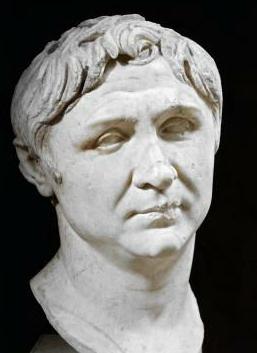 Pompey was understood to be the key figure in the triumvirate – and
took the lead in putting down rebellions in Syria (bringing it in as a
Roman province) and even marching his armies all the way East to the
Euphrates River (modern central Iraq) and the Caspian Sea.
Pompey was understood to be the key figure in the triumvirate – and
took the lead in putting down rebellions in Syria (bringing it in as a
Roman province) and even marching his armies all the way East to the
Euphrates River (modern central Iraq) and the Caspian Sea.
But Caesar was just as energetic, not only in bringing Celtic Gaul
under Roman rule, but in undertaking popular public works projects
ranging from public games to new roads. He also pushed for the
extension of Roman citizenship to the Italians of north Italy.
 Marcus Tullius Cicero.
Cicero was a self-appointed spokesman for conservative middle-class
interests – neither in favor of the patrician Senate nor the urban mobs
that threatened the old Republic. Cicero's election as Consul in
63 BC was in testimony of his appeal to this middle class, plus the
willingness of the patrician Senators to back him in fear of a worse
fate from the populist radicals. Marcus Tullius Cicero.
Cicero was a self-appointed spokesman for conservative middle-class
interests – neither in favor of the patrician Senate nor the urban mobs
that threatened the old Republic. Cicero's election as Consul in
63 BC was in testimony of his appeal to this middle class, plus the
willingness of the patrician Senators to back him in fear of a worse
fate from the populist radicals.
He was opposed by the fellow Senator Catiline, a very corrupt former
governor of Africa, who conspired to engineer widespread discontent
among a whole spectrum of people within the Republic (from the
supporters of Sulla, to the slaves, to even the people recently brought
by conquest into the Roman order), in order to make himself
dictator. Cicero, informed by Crassus of Catiline's plans,
exposed Cataline's plot – forcing Cataline to leave Rome … and take on
a Roman army sent after him, which resulted in Catiline's defeat and
death in battle.
Cicero was very alarmed at what was the clear deterioration of the
constitutional foundations of the Roman Republic – and thus of the
Republic itself … which he made in his many speeches (recorded in
Orations) and his writings (for instance, his very popular De
Officiis). Sadly, his efforts availed little in keeping the
Republic on its original foundations … although those same efforts
would serve very well in getting much later generations to understand
what constitutes excellent, and what constitutes destructive, social
dynamics.
6The
great American sage, Ben Franklin, was well aware, thanks to Rome's own
historical witness, of this problem facing any constitution.
Franklin had personally observed the severity of the political splits
hindering the creation of America's Constitution of 1787 … and the
difficulties involved in getting these groups to rise above
self-interest in order to finally develop a Constitution for all
Americans. Thus when questioned at the end of the long
Constitutional Convention (May-September 1787) and asked what kind of
government the delegates had finally come up with, he answered: A Republic … if you can keep it.
Tragically America has lost sight of such
wisdom … as it has given fewer and fewer hands (for instance, only a
majority of five Supreme Court justices) full power to rebuild the
American Constitution any way this small group chooses to do so.
Thus America's Constitution itself has become less "constitutional" and
more "political" over time ... like the Roman Republic in its last days.
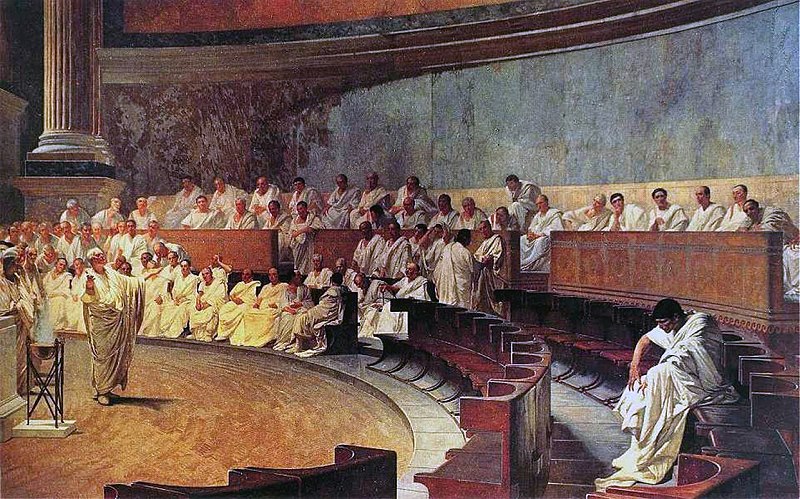
Cicero denounces Catiline
(by Cesare Maccari -1889)
|
Caesar Takes Full Power
When
in 53 BC Crassus was killed in battle against the Parthians (Persians),
a two-way power division now existed between Caesar and Pompey.
Also, despite the putdown of Cataline, riots and general disorder were
increasing in the capital – and in 52 BC even Cicero admitted to the
need to confer extraordinary powers on Pompey, now sole Consul.
Pompey became flattered by his title, and by all the attention of the
Senate … and was soon drawn into a Senate-inspired conspiracy against
Caesar.
The plan was not to renew Caesar's appointment as Consul – and indeed
to have him step down from his military command immediately. This
would then require Caesar to return to Rome to stand for re-election
without the military support that had by this time become all-essential
for success in Roman politics. Caesar refused. The Senate then
expelled his supporters – and Caesar at that point knew that he had to
take drastic steps to save himself. In March of 49 BC he crossed
with his troops into Italy, entered Rome at the head of his army
(Pompey and the majority of the Senate fled to Greece) and became the
sole ruler of Rome. |
ROMAN
INTELLECTUAL CULTURE DURING THE YEARS OF THE REPUBLIC |
|
Rome
never achieved the intellectual uniqueness of the Greek world … nor did
it attempt to do so. It was impressed enough with its ability to
simply draw on that Greek intellectual legacy for its own cultural
purposes. But nonetheless, there were numerous Romans who did
indeed add important items to that now Greco-Roman legacy.
Polybius (ca. 200 to 118 BC
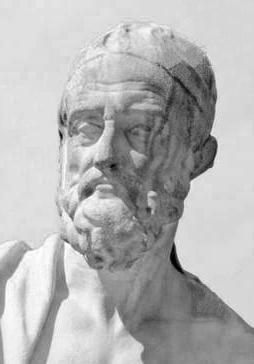 Polybius was not a Roman, but instead a Greek scholar and politician, who wrote a history about the rise
to power of Rome. When Macedonia was defeated by Rome in 168 BC.
he was brought as a political prisoner to Rome. But he was able
to use this misfortune to intervene on behalf of his Greek compatriots
to secure fairly gentle treatment by the Romans of the Greeks (the
Romans tended to be quite impressed with Greek civilization anyway.) Polybius was not a Roman, but instead a Greek scholar and politician, who wrote a history about the rise
to power of Rome. When Macedonia was defeated by Rome in 168 BC.
he was brought as a political prisoner to Rome. But he was able
to use this misfortune to intervene on behalf of his Greek compatriots
to secure fairly gentle treatment by the Romans of the Greeks (the
Romans tended to be quite impressed with Greek civilization anyway.)
Living there another 18 years, and becoming part of the political
circle of the powerful Scipio family, he became familiar with a number
of Roman notables. Thus when he eventually wrote the story of
Rome's rise to power (40 volumes of his Histories
covering the period up to the final conquest of Greece in 164 AD – with
only the first 5 volumes having survived to today), he did so with
particular insight.
Lucretius (96 to 55 BC)
The Roman poet and philosopher, Lucretius (Titus Lucretius Carus), was
a strong contributor to the Roman sense of material order. He was
a naturalist in the tradition of Democritus and Epicurus – holding a
very low view of the religion of his times. In his work De rerum natura (On the Nature of Things) he claimed that popular religion was the source of the worst superstitions and sources of human evil.
Cicero (again!) 106-43 BC.
 Although
Cicero considered his political work to be most important activity, his
writings left a huge mark on the intellectual culture of Western
society. His writings set the standard for Latin scholarship all
the way up to modern times. He was a devoted translator and
commentator on Greek philosophy ... in particular Plato ... and wrote
extensively on Greek philosophy in order to introduce it easily to the
Roman citizen. He also develop the art of oratory to professional
standards ... being only second to the Greek Demosthenes in rank as the
greatest orators in Western history. His essy De Officiis
(On Duties), written to his son, set out the principles of honorable or
noble public service ... and had such an impact on Western scholarship
that it was the second book after the Bible printed by Gutenberg. Although
Cicero considered his political work to be most important activity, his
writings left a huge mark on the intellectual culture of Western
society. His writings set the standard for Latin scholarship all
the way up to modern times. He was a devoted translator and
commentator on Greek philosophy ... in particular Plato ... and wrote
extensively on Greek philosophy in order to introduce it easily to the
Roman citizen. He also develop the art of oratory to professional
standards ... being only second to the Greek Demosthenes in rank as the
greatest orators in Western history. His essy De Officiis
(On Duties), written to his son, set out the principles of honorable or
noble public service ... and had such an impact on Western scholarship
that it was the second book after the Bible printed by Gutenberg.
Cicero's prose and oratory changed Latin from a rather ordinary or just
useful language into a powerful verbal tool able to give intricate
expression to the most complex ideas ... building Latin into the
foundational language of Western civilization ... which was then
carried forward in the West by the Christian Church ... and through the
ages the primary reading of young scholars developing their Latin
abilities.
Virgil (Publius Vergilius Maro) (70 to 19 BC)
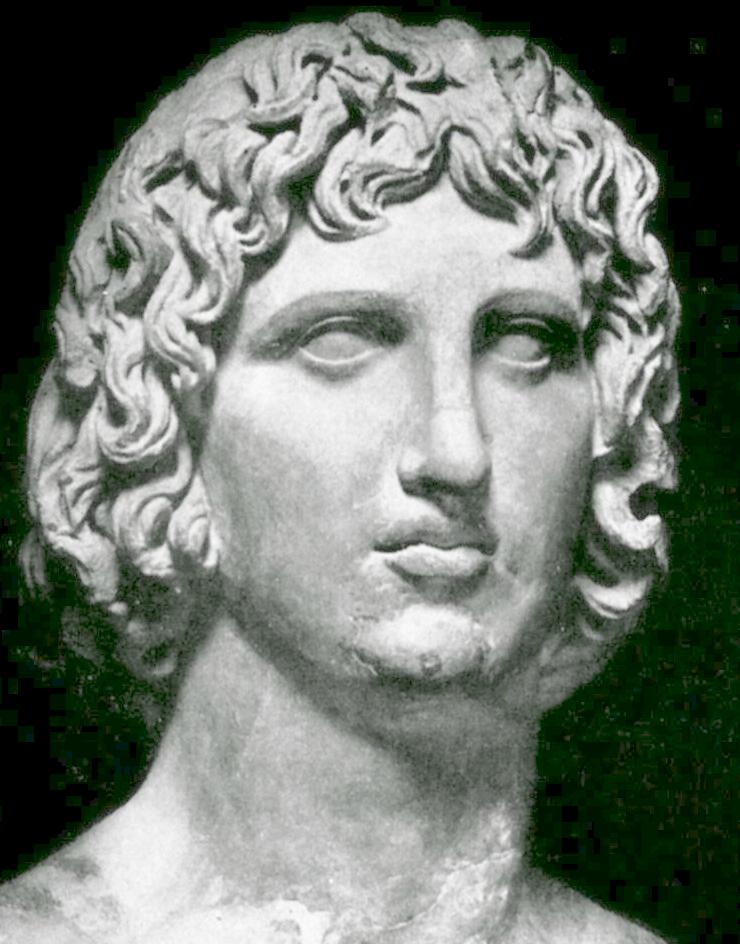
Virgil
was a Roman poet who dignified the Roman nationalist aspiration with
his vivid writings. His biggest project, one that had not yet
been completed to his satisfaction at his death, was the Aeneid.
This was the story of Aeneas, a Trojan survivor of the deadly war with
the Greeks, who set out on his own across the Mediterranean, lived for
a while in North Africa with the beautiful Dido, but in the end
tragically left her in order to journey to Italy and there establish a
settlement at Rome (a version very different from the older story of
the founding of Rome by the brothers Romulus and Remus). This
was, in short, the Roman answer to the Greek works of Homer, the Iliad and the Odyssey – designed to put Roman culture on a par with Greek culture, at least in terms of its supposed antiquity and heroic origins.
But it also struck a deep moral-ethical cord (something lacking in
Homer's works) in the way it portrayed Aeneas as a man who understood
the bitter-sweet of his destiny and was willing to face that destiny as
a matter of honor and duty (pietas) – even against odds that were
greater than life.
Horace (Quintus Hortius Flaccus) (65-8 BC)
Horace was a military officer turned poet during the time of Rome's
transition from Republic to Empire ... actually rather closely
associated with Octavian's new regime. Well-born and
well-educated, he found himself on the losing side of tough Roman
politics, but was pardoned and eventually became a civil servant in the
new regime.
Poetry was a sideline of sorts for Horace ... but where he truly left
his mark on his times. He never lost his interest in Roman
politics, and his writings offered some important insights into the
dynamics of his times. His poetry was often satirical, even
caustic at times, such as his Epodes and Satires ... uncovering faults
in the world around him – and in his own life (he was very
autobiographical in his writings). He himself was also deeply
influenced philosophically by the rising Epicureanism and – to a lesser
extent – the Stoicism of the times ... evidenced strongly in his
Satires, Epistles and Odes. But ultimately, his real talent was
in putting before Roman society a higher standard of Latin literary
form ... studied carefully by succeeding generations.
Ovid (Publius Ovidius Naso) (43 BC to AD 17 or 18)
Ovid was a poet ... who actually wrote a huge history of the world
(from the "beginning" or "Creation" up to the time of the death of
Julius Caesar) in the form of some 250 myths – in the 15 books
comprising the Metamorphoses.
He was very popular in his time because of the very artful way that he
presented these historical sketches ... and would be a person of great
interest again in the late Middle Ages / Early Renaissance
(1300s/1400s). These "histories" gave him the opportunity to
present matters of virtue and morality ... especially as these touch on
man's relations with the gods.
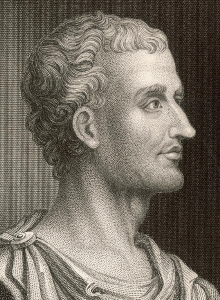 Livy (Titus Livius) (59 BC-17 AD) Livy (Titus Livius) (59 BC-17 AD)
Livy created an invaluable History of Rome
covering the period from the rise of Rome up to his own time ... just
as the empire was beginning to replace the republic under Augustus
Caesar. Understandably, Livy was very well appreciated in his own
time. Unfortunately, only portions of his work have survived down
to today, probably lost sometime during the Middle Ages. But we
have today Books 1-10 and 20-45 ... the rest (books 11-20 and 46-142)
being lost to us. Nonetheless, what we do have gives us an
excellent glimpse, from a very practical standpoint, of Rome's
development ... beginning as far back as the period of Etruscan
domination and Rome's spread across Italy.
|

 Miles
H. Hodges Miles
H. Hodges
| | | | |


 An overview of Republican Roman
An overview of Republican Roman The expansion of Republican Rome
The expansion of Republican Rome
 Early Roman political organization
Early Roman political organization
 Roman intellectual culture during the
Roman intellectual culture during the


